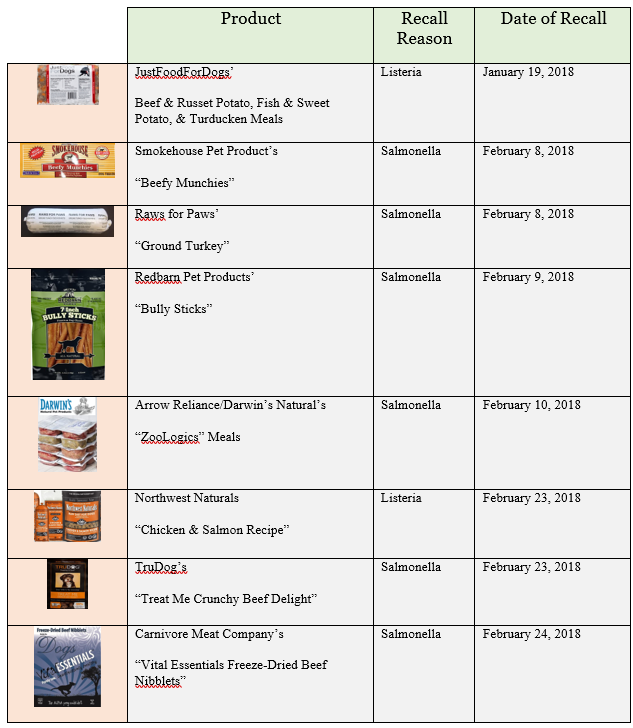Attention Dog Owners: Growing Number of Companies Recalling Contaminated Pet Food

February 2018: Pet owners should run check their pet foods immediately. The Food and Drug Administration has issued a string of massive recalls on contaminated dog foods so far this year. Thus far, seven dog food and treat products have been recalled due to Listeria or Salmonella contamination. The following summarizes the recalls:
Both Salmonella and listeria can affect not only animals eating the contaminated products, but also present a risk to humans, particularly if they have not thoroughly washed their hands after having contact with the products or any surfaces exposed to these products. Even if a pet does not get sick, they can become carriers of the bacterias and transfer them to their surroundings and owners.
In the event that this happens, the individual should consult a skilled product liability attorney that could help them seek compensation for their injuries.
What are the Symptoms of Salmonella Infection (Salmonellosis)?
People infected with Salmonella can develop diarrhea, fever and abdominal cramps. The illness usually lasts 4 to 7 days, and most people recover without treatment.
Pets do not always display symptoms when infected with Salmonella, but signs can include vomiting, diarrhea (which may be bloody), fever, loss of appetite and/or decreased activity level. Pets can pass Salmonella to humans without showing any signs of the illness themselves.
How Soon After Exposure do Salmonellosis Symptoms Appear?
Most people infected with Salmonella develop diarrhea, fever, and abdominal cramps 6 to 72 hours after infection. Although not all pets display symptoms when infected, those who do may have symptoms within 72 hours of infection. Pets do not need to display symptoms to be able to pass Salmonella onto their human companions. Once Salmonella gets established in the pet’s gastrointestinal tract, the animal can shed the bacteria when it has a bowel movement, and the contamination will continue to spread.
What are the Symptoms of Listeria Monocytogenes Infection (Listeriosis)?
People infected with Listeriosis can be fatal, especially in certain high-risk groups. In addition, when Listeria monocytogenes infects a woman during pregnancy, it can cause miscarriage, stillbirth, premature labor, and serious illness or death in newborns.
In severe cases of listeriosis in pets, symptoms include fever, muscular and respiratory signs, abortion, and death.
gastrointestinal symptoms including diarrhea, fever, and muscle aches are symptoms of infection with Listeria monocytogenes.
Fatal Nature of Listeria
Listeriosis can be fatal, especially in certain high-risk groups. In addition, when Listeria monocytogenes infects a woman during pregnancy, it can cause miscarriage, stillbirth, premature labor, and serious illness or death in newborns. In severe cases of listeriosis in pets, symptoms include fever, muscular and respiratory signs, abortion, and death.
Listeriosis is not common in pets, and when infected, typical symptoms include diarrhea and vomiting. Pets can pass Listeria monocytogenes to humans without showing any signs of the illness themselves.
How Soon After Exposure do Listeriosis Symptoms Appear?
Gastroenteritis caused by Listeria has a relatively short incubation period, from a few hours to 2 or 3 days. The severe, invasive form of the illness can have a very long incubation period of 70 days or more.
Although not all pets display symptoms when infected, those who do may have symptoms within a matter of a few hours, but possibly weeks after infection. Pets do not need to display symptoms to be able to pass Listeria onto humans.
Who is at Risk of Salmonellosis and Listeriosis?
High-risk groups include the elderly, people with weakened immune systems, and pregnant women. Very young children are at risk if exposed to Salmonella or Listeria by crawling on or otherwise touching contaminated surfaces and put their hands or other objects in their mouth (without handwashing), or have oral contact with an animal that has consumed contaminated pet food, or with that animal’s feces. Once Salmonella or Listeria gets established in the pet’s gastrointestinal tract, the animal can shed the bacteria when it has a bowel movement, and the contamination will continue to spread.
Others at increased risk of serious infection are the elderly, pregnant women, and people with weakened immune systems.
As with humans, dogs and cats who are very young, very old, or have health conditions are at an increased risk for developing listeriosis. If you purchased any of these recalled products you should immediately stop using it. If you experience symptoms following using the product, you should contact your healthcare provider.
Consulting a Toledo Product Liability Attorney
If your pet has consumed any of these products or is exhibiting any symptoms, you should immediately talk to your veterinarian.
If you or a family member have been affected by these products, please call our firm at (877) 230-6690 to find out if you have a claim for compensation. An attorney and a medical professional evaluate each case and let individuals know what they believe the best course of action to be. All case evaluations and consultations are free and confidential.

